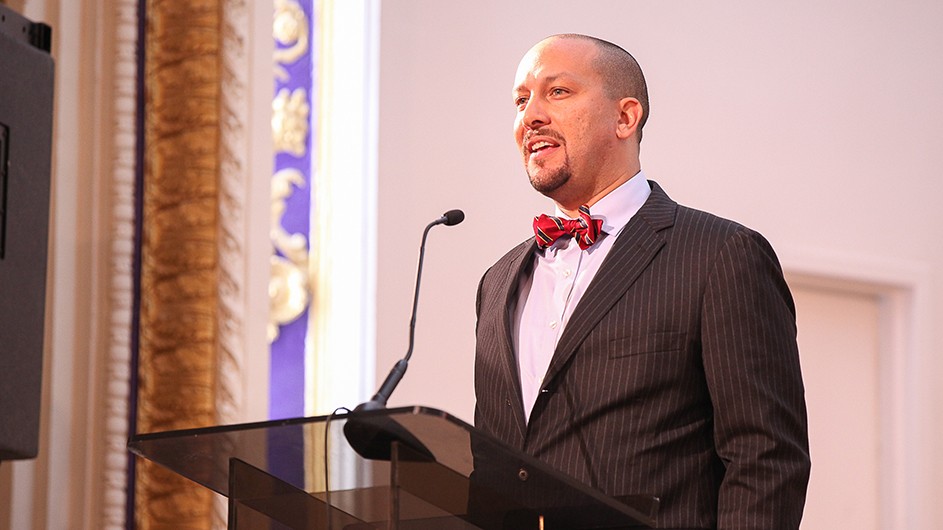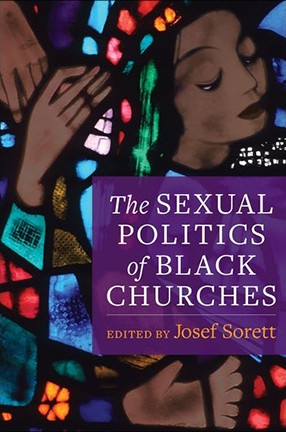A New Book Examines the Sexual Politics of Black Churches
Professor Josef Sorett brings together an interdisciplinary roster of writers to analyze issues involving religion, race, gender, and sexuality.

The Sexual Politics of Black Churches, edited by Professor Josef Sorett, chair of the Religion Department, brings together an interdisciplinary roster of scholars and religious practitioners to analyze the politics of sexuality within Black churches and the communities they serve. In essays and conversations, writers reflect on how Black churches have participated in recent discussions about issues such as marriage equality, reproductive justice, and transgender visibility in American society. They consider the varied ways that Black people negotiate the intersections of religion, race, gender, and sexuality across historical and contemporary settings.
Sorett discusses the book with Columbia News, along with what books he’s read recently, and what it’s been like teaching Columbia’s Core Curriculum for the first time this year.
Q. How did this book come about?
A. This book began over 10 years ago with a public conversation and a follow-up smaller dialogue that I organized in the summer of 2010. At the time, against the backdrop of a growing push for what was then called “same-sex marriage,” there was a good deal of concern that Black churches would be a significant obstacle for achieving marriage equality.
l led a series of conversations about these issues in Black churches around the country in 2007. The foundation that funded that study then invited me to bring together a group of scholars and religious practitioners to think through the same kinds of questions, especially in the wake of California’s 2008 ballot initiative, Proposition 8, which was intended to ban same-sex marriage. The 2010 convenings, and the presentations made on that occasion, eventually developed into what are now most of the chapters in this book.

Q. How does the book illustrate how Black churches have been a part of recent conversations on issues such as marriage equality, reproductive justice, and transgender visibility?
A. The book engages these discussions from multiple angles. Some chapters are written for scholarly experts. Others are oriented toward a more public audience. There are chapters that readers might think of as being more practical. For example, two chapters present different ways of engaging the Bible to rethink public debates about gender and sexuality. Two other chapters suggest models for preaching about sex, or about the connection between body and spirit.
There are also chapters that analyze different dimension of Black Christian practice, historical and contemporary, and focus on a range of themes, including models of Black masculinity, kinship structures, and media ministries. And then there are chapters that serve to model the complexity of the kinds of conversations that the book hopes to encourage—in academic and church contexts, and for general public discourse.
Q. What have you read recently that you would recommend?
A. Most of my recent reading has moved in three distinct directions: Books that are helping me with something I’m writing, books on the syllabus for what I’m currently teaching, and books that my sons are reading. In the first category, I’ve done a bunch of reading recently that helped me finish up a book that will be out at the end of this year. In doing this reading, I learned so much from The Terms of Order: Political Science and the Myth of Leadership by Cedric Robinson. And Erica Edwards’ foreword to the new edition was especially helpful for thinking about religion, and Black churches specifically, in the larger corpus of Robinson’s work, which is rightfully receiving so much attention in debates in Black studies at the moment.
Q. What's on your night stand now?
A. This question leads to the third category I mentioned above—what my sons are reading. I’m a bit behind in this regard, but Nic Stone’s Dear Martin—about a teenage boy who starts writing letters to Martin Luther King, Jr. as he navigates the complexities of his social world—is a current read. I’ve only just started it, but hope to finish it soon, as my younger guy has been asking about it for several weeks now. If I’m honest, the item on my night stand that has received more attention as of late is my IPhone, as I am still dealing with a Wordscapes habit that began shortly after the shutdown in the spring of 2020.
Q. What are you teaching this semester?
A. I’m teaching the second semester of Contemporary Civilization. This is the first year I’ve taught in Columbia’s Core Curriculum, so the learning curve has been steep. But doing so has, I think, helped me better understand Columbia’s culture. It has also allowed me to revisit some books that I had not read in well over a decade, and required me to read, for the first time, others that perhaps I should have read years ago.
Adam Smith’s Wealth of Nations, Jeremy Bentham’s An Introduction to the Principles of Morals and Legislation, and Mary Wollstonecraft’s A Vindication of the Rights of Woman were on the syllabus in recent weeks. Each of these texts has proven helpful in thinking through so many issues we face today, be it the contours of capitalism, questions of criminal justice, or debates about gender and equality.
Check out Books to learn more about publications by Columbia professors.